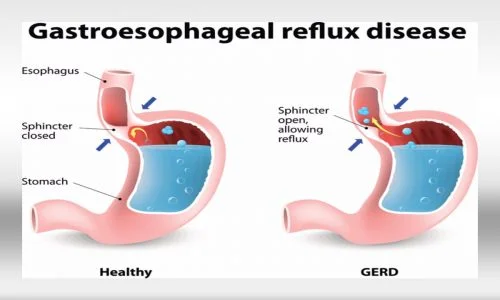Acidity Doctor in Navi Mumbai - Dr. Sonali Gautam
What is Gastroesophageal Reflux Disease (GERD)?

- Heartburn is a burning sensation felt behind the breast bone that occurs when stomach contents irritate the normal lining of the esophagus.
- Acid regurgitation is the sensation of stomach fluid coming up through the chest which may reach the mouth.
- Unexplained Chest Pain
- Sore Throat
- Night Cough
What causes Gastroesophageal Reflux Disease?
Gastroesophageal reflux disease (GERD) occurs when there is an imbalance between the normal defense mechanisms of the esophagus and offensive factors such as acid and other digestive juices and enzymes in the stomach. Often, the barrier between the stomach and the esophagus is impaired by weakening of the muscle (lower esophageal sphincter) or the presence of a hiatal hernia, where part of the stomach is displaced into the chest.
Obesity, pregnancy, smoking, excess alcohol use and consumption of a variety of foods such as coffee, citrus drinks, tomato-based products, chocolate, peppermint and fatty foods may also contribute to reflux symptoms.
How is Gastroesophageal Reflux Disease diagnosed?
When a patient experiences common symptoms of gastroesophageal reflux disease, namely heartburn and/or acid regurgitation, additional tests prior to starting treatment are typically unnecessary.
If symptoms do not respond to treatment, or if other symptoms such as weight loss, trouble swallowing or internal bleeding are present, additional testing may be necessary. Upper endoscopy is a test in which a small tube with a light at the end is used to examine the esophagus, stomach and duodenum (the first portion of the small intestine). Before this test, you will receive medications to help you relax and lessen any discomfort you may feel. An upper endoscopy allows your doctor to see the lining of the esophagus and detect any evidence of damage due to GERD.
A biopsy of tissue may be done using an instrument similar to tweezers. Obtaining a biopsy does not cause pain or discomfort. Another test, known as pH testing, measures acid in the esophagus and can be done by either attaching a small sensor into the esophagus at the time of endoscopy or by placing a thin, flexible probe into the esophagus that will stay there for 24 hours while acid content is being measured. This information is transmitted to a small recorder that you wear on your belt.
When should I see my doctor?
If symptoms do not respond to medical treatment or necessary medical For Eg. Upper Endoscopy, PH Testing, heartburn or acid regurgitation.
What happens after upper endoscopy?
If symptoms do not respond to medical treatment or necessary medical For Eg. Upper Endoscopy, PH Testing, heartburn or acid regurgitation.
If you’re seeking relief from gastroesophageal reflux symptoms consider consulting with Dr. Sonali Gautam, an experienced acidity doctor in Navi Mumbai who is dedicated to improving your digestive health and overall quality of life.
